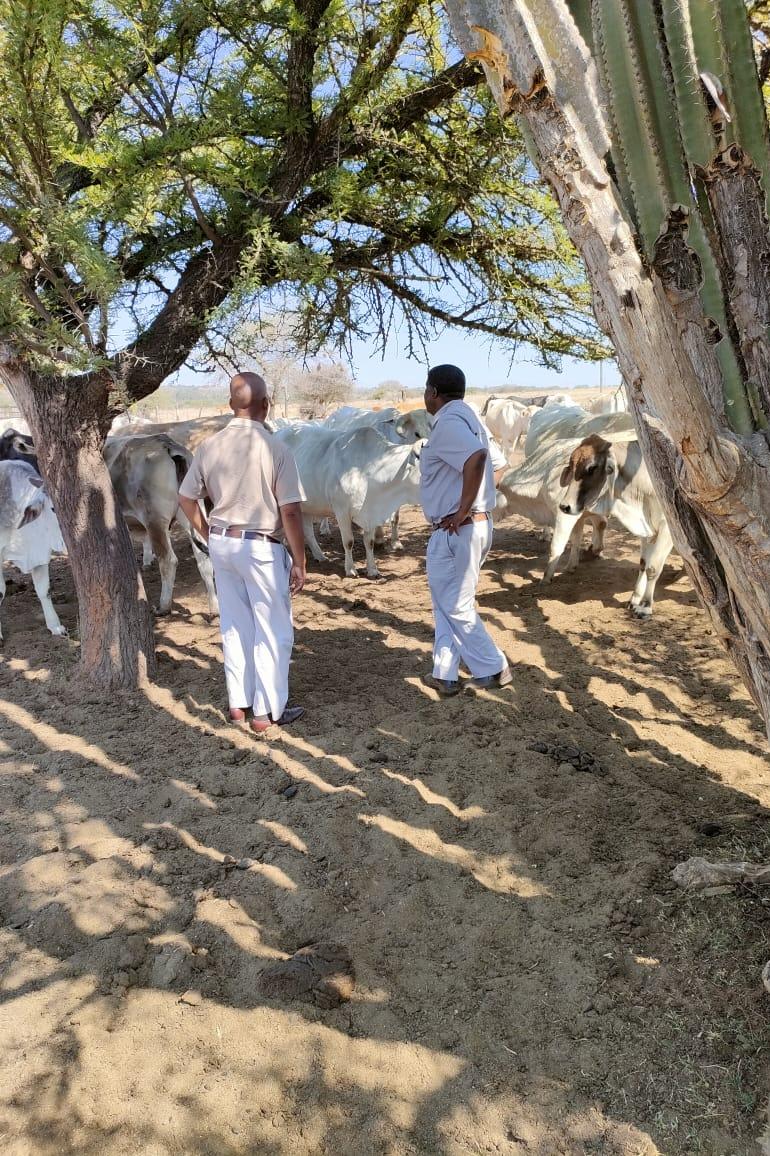Official training provider for the Red Meat Industry Cluster
.
On-farm training
We come to you to
AgriSeta Accredited
Registration number: AGRI/C PROV/2070/22
Expert Facilitators
With a background in animal science and production studies

Animal Husbandry
US 12587, US 116197
NQF Level 1- Identifying general symptoms of sick animals
- Knowledge of common diseases
- Record-keeping
- Basic vaccination and immunisation programmes
- Correct procedures for handling vaccines
- Dipping and tick control
- Correct animal handling
- Procedures for restraining and herding animals
- Dehorning and castration
- Marking and identification
- Heat detection
- Feed and water practices and supply

Livestock Handler
US 116197, US 116643, US 116074
NQF Level 1, 2- Observing, recording and reporting on normal and abnormal animal behaviour and physical attributes
- Herding animals in a controlled manner
- Restraining animals in a restraint facility
- Preparing and administering livestock-processing treatments
- Selecting vaccines and pharmaceuticals
- Adhering to animal and human safety precautions
- Applying treatment procedures
- Observing biosecurity principles

Feedlot Unit Controller - Disease and Biosecurity
US 116219, US 116637, US 116308
NQF Level 1, 2- Carrying out animal health procedures and supervising the way animals are restrained for such procedures
- Performing basic veterinary procedures
- Treating and vaccinating animals under supervision
- Implementation of basic principles of biosecurity
- Preparing the weighing facility, determining livestock mass and restoring the weighing facility to an inoperative status
- Supervising animal disease prevention
- Ensuring that the basic clinical examination is done correctly

Artificial Insemination
US 116107, US 116215
NQF Level 1- Breeding principles and practices
- Heat detection
- Normal and abnormal behaviour during the birth process
- Post-partum behaviour
- Basic artificial insemination practices and procedures

Occupational Health & Safety
US 123172
NQF Level 2- Gaining knowledge of responsibilities of the employer and the employees
- Knowledge of requirements for transport, loading and equipment safety
- Steps to be taken during emergency situations

Socio-economic Empowerment
US 13996, US 13357, US 15092
NQF Level 1- Working effectively within a workplace
- Understanding the free-market economic system and the farmworker’s role in it
- Understanding agricultural production systems and the importance of productivity
- Planning and managing personal finances

Prevent & Treat Animal Diseases
US 116219
NQF Level 1- Perform animal restraint and related procedures
- Perform basic veterinary procedures
- Treat and vaccinate animals under supervision
- Supervise the carrying out of basic principles of biosecurity
- Carry out pre-planned programs

Implement Animal Health & Biosecurity
US 116308
NQF Level 1- Supervise animal disease prevention and ensure correct practices are in place
- Ensure that basic clinical examination is done correctly
- Ensure correct dosage rates and calibrate and use instruments correctly
- Ensure that vaccination and treatment are done correctly

Determine Feedlot Mass
US 116637
NQF Level 1- Preparing the weighing facility
- Determining livestock mass
- Record and submit determined mass
- Restoring the weighing facility to an inoperative status

The Feedlot Environment
US 116647
NQF Level 1- Identify and describe industry role players and structures
- Evaluate livestock purchase regions
- Demonstrate an understanding of relevant legislation applicable to the livestock industry
- Apply feedlot production and slaughter norms

Feedlot Feed Ingredients & Blends
US 116653
NQF Level 1- Identify basic feedlot ingredients
- Distinguish between blended feedlot feeds
- Identify the quality of blends.
The blended feed includes but is not limited to starter, grower, finisher, and hospital diets.